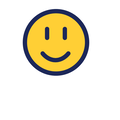Let’s start off on the right foot
“If you can't change your fate, change your attitude.” —Amy Tan

The skinny
Recent empathy study reveals that Gen Z’s optimism dropped as they expect more action and less talk.
♥
Gen Z can talk to the hand.
My, my someone’s a little grumpy. Although I know there’s been some generation clashes recently, Gen Z is here to stay my friend, and they are not happy.
Boo, hoo.
Sure, it’s not just them. We’ve all had our generation-defining moments/disasters. And 2020 wasn’t a walk in the park for anyone. Well, we all walked in parks probably more than we wanted to, but you get my drift. The fact is, Gen Z reported higher stress levels compared to other generations in 2020. They also reported the highest unemployment rates throughout the pandemic.
Why so stressed?
Well. That answer is definitely multifaceted. But one thing is clear, Gen Z does not perceive their employers as empathetic and that’s a major problem.
What do you mean?
Gen Z’s rating of their own organizations’ empathy dropped by 14 percentage points from 2020 to 2021. Because they are up against tough challenges, empathy matters to Gen Z more than other generations and therefore they seek out empathetic employers.
What is an empathetic employer?
Great question. Organizations that offer certain benefits (like flexible schedules and mental health benefits) are considered empathetic, but when it comes to Gen Z it’s more about empathetic responses. For example, fewer Gen Zers say that empathy automatically stems from diverse hiring. This suggests Gen Z is more focused on the consistent, systemic, and long-term actions that employers take to enhance equality and inclusion. Basically, all talk and no action is not going to fly for Gen Z.
So, the buggers need empathy.
Yes, 90% of Gen Z say they are more likely to stay with an empathetic employer. Only part of the Zers have entered the workforce, but they represent the fastest-growing group. Their empathy-related values differ from the people leading them, but organizations who adapt to Gen Z’s expectations have the opportunity to build a more resilient workforce for the future.
Date with data: 47% of Gen Z employees report awareness of mental health programming at their workplace, compared to 56% of all employees.
Totes quotes: "If you are a boomer like me or an older [Generation] X-er, you certainly didn't get a lot of feedback along your career journey. You were definitely told, 'Keep your head down, work really hard, and if you don't get fired you know you're doing okay.' That kind of leadership will never do in today's environment." —Carla Harris, Vice Chairman, Global Wealth Management, Managing Director & Senior Client Advisor, Morgan Stanley
Further reading: 2021 State of Workplace Empathy Study
The skinny
Survey reveals that even though employers expanded paid leave benefits, many employees are fearful of workplace repercussions if they take time off.
♥
icksnay on the acationvay?
Some are. There’s certainly a disconnect between employers and employees when it comes to vacation. In the survey, 75% of employers said they expanded their paid leave benefits to help workers deal with problems created by the pandemic. However, data suggested a stigma remains around paid leave.
What stigma?
A significant number of employees said they were fearful of workplace repercussions like getting fired/laid off or having their hours reduced or getting skipped over for a promotion if they took time off. And 29% of workers said there is a negative perception associated with taking leave.
Bummer.
Major. Taking time away from work is extremely important for mental health and productivity. With burnout on the rise, employers need to encourage and support employees taking the time they need to recharge.
Offering more vacay isn’t enough?
Nope. Unfortunately, overwork culture is a thing. We think longer hours and constant exhaustion is a maker of success. Real Gordon Gekko energy. And new studies show that many employees are putting in an average of 9.2 hours of unpaid overtime per week. Many people think if they stop working, they’ll be left behind.
Rise and grind, mf!
Ok no, the opposite. Expanding time off benefits is a great start to helping employees reset. But if you have a culture that embraces overwork, then it doesn’t matter how many vacation days you offer.
Totes quotes: “If you take a plant and put it in a pot and don’t water it and give it lousy soil and not enough sun, I don't care how gorgeous the plant was to begin with—it isn't going to thrive.” —Christina Maslach, professor emerita of psychology at the University of California, Berkeley
Totes two: “We dehumanized the workplace a long time ago.” —Anat Lechner, clinical associate professor of management at New York University
Further reading: A complete guide on how to disconnect and unplug.

The skinny
There are a few simple tweaks you can make to improve your happiness levels immediately and build better happy-habits.
♥
Happiness…
Yeah. I know it might be a muscle that has atrophied over these past few months. But just like Bennifer, happiness is making a comeback in 2021!
Might need some tips.
Sure. First, take stock. It’s important to be self-aware about what is filling your happiness cup and what is draining it. Make a list of all the things that bring you joy verses the things that don’t. The key to this exercise is that this list should be things you can control. From there, reflect on how you can manage your time doing more of the things you love while limiting the time you spend on happiness drainers.
Ok, making list now.
Good. After that, it’s time to start focusing on your a.m. self. Starting your morning on a positive note is one of the most impactful things you can do to develop day-to-day happiness.
I don’t have time to have a morning.
#Mythbuster time. Having a positive morning routine doesn’t require hours of your time but it does have the power to transform your day.
Ok, enlighten me.
Instead of immediately rushing into the day or grabbing your phone and starting to scroll, take a minute for yourself without any distractions and set an intention for the day ahead. What do you want to achieve, how do you want to achieve it, and with what attitude? Purposefully deciding how you want to experience and react to situations instead of being in defense/reactive mode all day is a great exercise for being more present and intentional.
Totes quotes: “We all yearn for the end of the human suffering brought about by the pandemic. And many, if not most, of us look forward to the end of the constraints and inconveniences it has imposed. But deep inside, there are probably a few things you dread about going back to normal life. Each of us, if we are brutally honest, could make a list of the activities and relationships that we didn’t like in pre-pandemic times, but that we accepted through self-deception, sheer inertia, and the pressure to go along and get along.” —Arthur Brooks, American social scientist, and author
Further reading: Stop spending time on things you hate.
 Now a break from the news… |
Compliance Corner |
Here’s something to…
- Celebrate: AAPI Heritage Month.
- Text: 20 texts to comfort someone who’s feeling anxious.
- Listen to: Do we even know how to socialize anymore?
- Read: Companies weigh requiring vaccines.
- Bookmark: What great mentorship looks like in a hybrid workplace.
- Collect: American Women Quarters Program
|

Benefits Insight Dashboard
Are your employees confused about their healthcare benefits?
|
|


